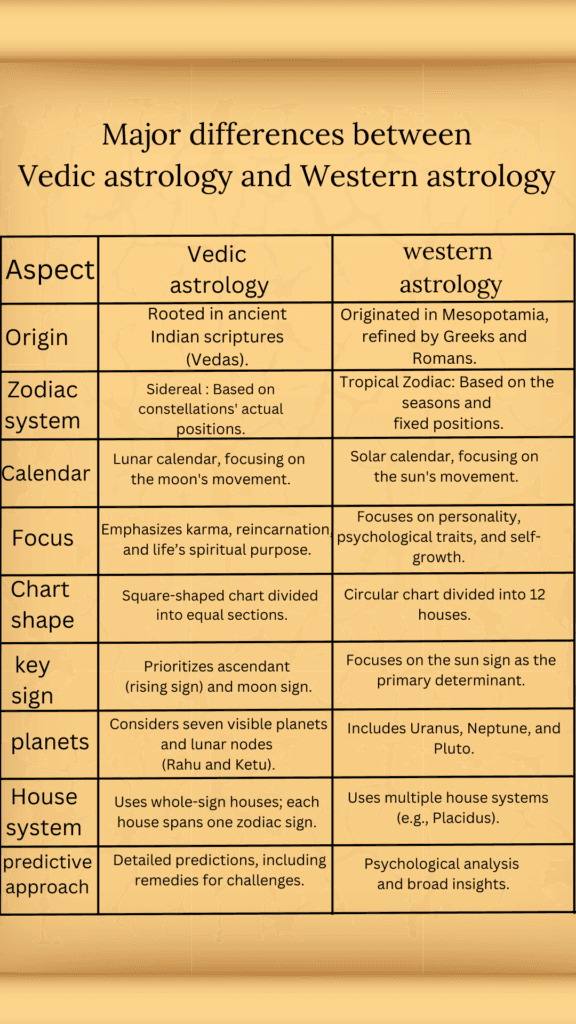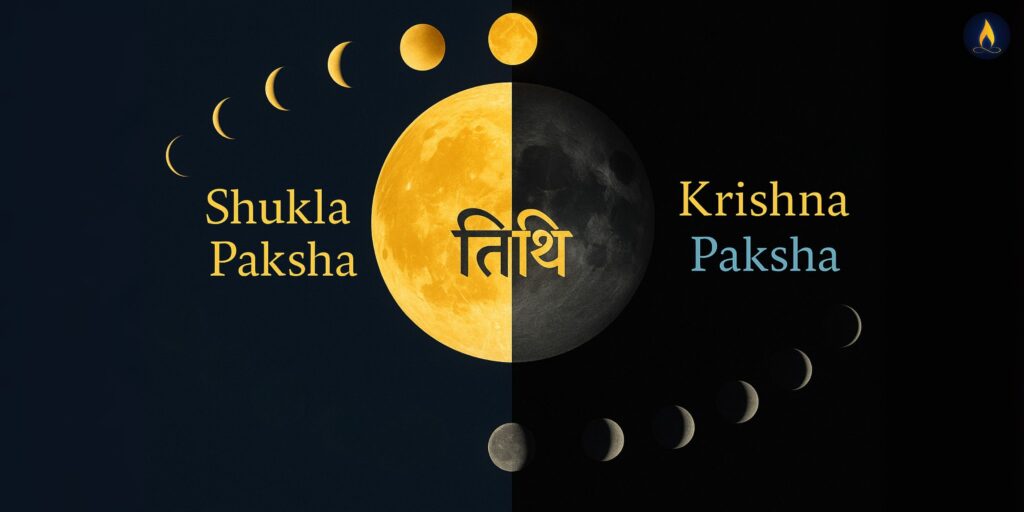Blog Contents
ToggleAstrology has long intrigued humanity; however, Vedic astrology stands out with its precision and spiritual depth. Rooted in ancient vedic hindu wisdom, it offers clear, actionable insights, making it superior to Western astrology for those seeking clarity and purpose.
In this blog, we’ll compare Vedic and Western astrology across various aspects to uncover what truly sets them apart.
Introduction
Astrology has been a guiding force across cultures, helping individuals understand their destiny, personality, and purpose. While Western astrology focuses on personality traits and self-awareness, Vedic astrology on the other hand offers a deeper connection to karma, spirituality, and precise life predictions. Its ability to calculate exact planetary positions and provide actionable remedies makes it a more comprehensive system.
lets compare the major differences between these two remarkable astrological systems on various aspects.
Historical Background
Vedic Astrology:
Originating in the Vedas over 5,000 years ago, it integrates spirituality, rituals, and precise mathematical techniques. Its longevity and cultural significance in Vedic hindu society underscore its reliability and depth.
Western Astrology:
Rooted in Mesopotamian traditions and refined in ancient Greece and Rome, it evolved as a personality-centric system, focusing on psychological insights.
Philosophical Focus: Karma vs. Psychology
Vedic Astrology:
Stands out for its emphasis on karma and dharma (life purpose). It not only explains current life situations but also offers remedies to effectively balance past-life influences and align with one’s spiritual path.
Western Astrology:
It focuses on understanding personality and fostering self-awareness; however, it lacks the predictive and karmic depth that is central to Vedic astrology.
Zodiac Systems: Sidereal vs. Tropical
Vedic Astrology:
Uses the sidereal zodiac, which aligns with the actual constellations. This dynamic approach accounts for the precession of equinoxes, ensuring accurate planetary positioning.
Western Astrology:
Employs the tropical zodiac, which is fixed to seasons, ignoring the shifting positions of constellations, leading to less precise interpretations.
Birth Chart Configurations
Vedic Astrology:
Features square or diamond-shaped charts, with additional divisional charts (Vargas) to provide a nuanced analysis of specific areas like marriage, career, and wealth. This multi-layered approach enhances predictive accuracy.
Western Astrology:
Represents the birth chart as a circle, focusing mainly on planetary positions in 12 houses, with fewer divisional tools for detailed predictions.
Know more about Vedic astrology Birth chart,on our blog. click here 👇 :
https://astroparasar.com/vedic-astrology-birth-chart/
The Role of the Ascendant, Sun, and Moon
Vedic Astrology:
Prioritizes the ascendant and moon sign, considering them crucial for analyzing one’s personality, emotions, and daily challenges. This makes its insights more specific and actionable.
Western Astrology:
Centers on the sun sign, which provides only a general understanding of personality traits.
Planets and Their Influence
Vedic Astrology:
Focuses on seven visible planets and the lunar nodes (Rahu and Ketu), believed to have significant karmic implications. By excluding distant planets like Uranus, Neptune, and Pluto, Eastern astrology ensures its focus remains practical and relevant.
Western Astrology:
It includes outer planets; however, their influence is often abstract and less impactful in daily life.
Know more about Roles of planets in vedic astrology, on ur blog. click here 👇:
https://astroparasar.com/the-role-of-planets-in-astrology-what-each-planet-represents/
House Systems and Interpretations
Vedic Astrology:
Employs the whole-sign house system, where each house corresponds entirely to one zodiac sign, enhancing clarity in interpretation.
Western Astrology:
It uses various house systems (e.g., Placidus), which, in turn, can complicate interpretations and lead to inconsistencies.
Know more about Importance of Houses in Vedic Astrology, on our blog. click here 👇:
https://astroparasar.com/importance-of-houses-in-astrology-what-each-house-represents-in-your-life/
Timing Techniques and Predictive Methods
Vedic Astrology:
Features Dashas (planetary periods) and transits, enabling precise life event predictions. This system can pinpoint periods of prosperity or challenges and recommend remedies like mantras or gemstones.
Western Astrology:
Relies on planetary aspects and progressions, offering broader, less specific predictions.
Cultural and Practical Applications
Vedic Astrology:
Integral to Hindu culture, it guides matchmaking, career choices, and spiritual practices.
It also provides remedies for overcoming life’s challenges; therefore, it is highly practical.
Western Astrology:
It is popular for personality analysis and compatibility; however, it lacks actionable solutions for mitigating challenges.
To better understand the differences between Vedic astrology and Western astrology, let’s examine various aspects in the table below:

Why Vedic Astrology is Better?
- Accuracy: The sidereal zodiac ensures precise planetary calculations.
- Spiritual Depth: Its focus on karma, dharma, and remedies provides holistic life guidance.
- Predictive Power: Tools like Dashas and Vargas offer detailed and actionable insights.
- Practical Remedies: From mantras to gemstones, Eastern astrology provides ways to improve life circumstances.
- Comprehensive Analysis: Emphasis on the ascendant, moon sign, and divisional charts makes its interpretations multi-dimensional.
FAQs
1. Is Vedic astrology more accurate?
Yes, Vedic astrology is often considered more accurate due to its use of the sidereal zodiac, which aligns with the actual positions of constellations. It also incorporates detailed timing systems like Dashas and divisional charts, providing precise predictions and actionable remedies.
2. What’s the difference between Western astrology and Vedic astrology?
The primary difference lies in the zodiac system: Vedic astrology uses the sidereal zodiac, while Western astrology uses the tropical zodiac. Vedic astrology emphasizes karma, spirituality, and predictive techniques, whereas Western astrology focuses more on personality and psychological insights.
3. What are the main principles of Vedic astrology?
The core principles of Vedic astrology include: Karma and Dharma: Understanding life’s purpose and past-life influences. Sidereal Zodiac: Using actual planetary positions. Dashas: Timing systems for life events. Divisional Charts: Detailed analysis of specific life areas.
4. Why doesn’t Vedic astrology use Uranus, Neptune, and Pluto?
Vedic astrology focuses on visible planets and lunar nodes (Rahu and Ketu) due to their proximity and stronger influence on human life. Outer planets are excluded as their effects are considered less significant.
5. Which is better for life predictions: Vedic or Western astrology?
Vedic astrology is better suited for life predictions because of its precise techniques, such as Dashas and transits, which can accurately predict events and provide remedies for challenges.
click here to read about Vedic Astrology (Jyotish): What Is It and How It Is Different from Western Astrology










